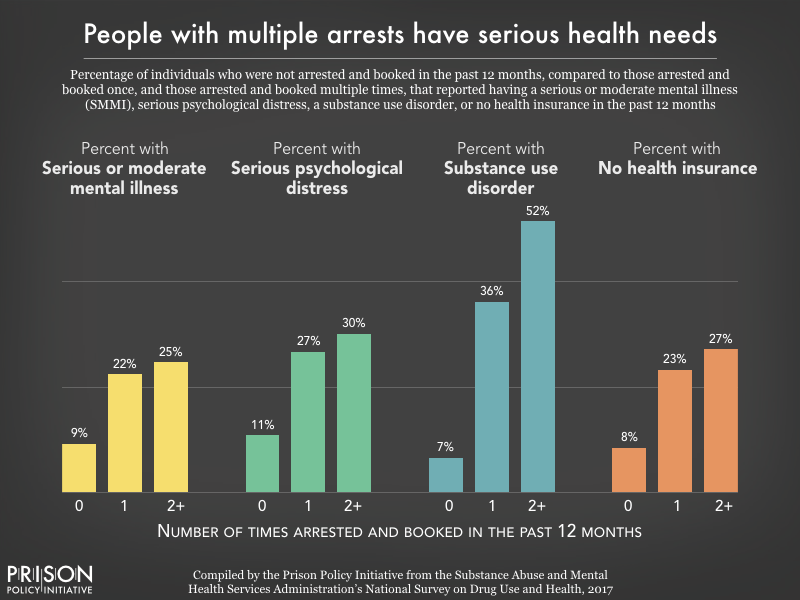Connecting state and local government leaders
A new report sheds light on how many people are arrested and booked into jail several times per year, often because of mental health or substance abuse problems.
About 4.9 million people are arrested and sent to local jails annually across the U.S., and many of them will return more than once during the course of the year.
A new report from the Prison Policy Initiative, a left-leaning research center, attempts to understand how the people arrested and sent to county and municipal jails arrived there, and what services might be used to stop people from cycling through repeatedly.
On any given day, local jails nationwide hold about 612,000, more than the population of Wyoming.
“We’ve known the number of people in jail every year, but insight at a more granular level is key,” said Alexi Jones, a coauthor of the report. “We have to know how many people are coming back over and over again without getting help.”
About 4.9 million people are jailed in the U.S. each year—and most are only arrested once. But one in four are arrested more than once per year, and 428,000 people are arrested three or more times per year.
Jones said that the commonalities in this group of “frequent utilizers” are clear: they are often black, low-income, less educated, unemployed, and dealing with mental health or substance abuse issues. Almost 88% of the people arrested most frequently were booked for nonviolent offenses like drug possession, public drunkenness, and violation of probation or parole terms.
Parole and probation violations aren’t just a problem for jails—they’re also causing issues for state prisons. In some states, almost 80% of prison admissions are for these reasons, spurring many state officials to reconsider the support services they provide to people on parole or probation. Sometimes, as was the case in Missouri last year, the government has to choose between building new facilities to hold surging incarcerated populations, or investing the money in community programming.
Jones favors the latter, and said that governments who budget for preventative services are making an “economically wise” decision.
Since so many frequent utilizers have health problems, Jones said that governments that invest in community drug treatment programs, better mental health services, and substance abuse treatment see a 12-to-1 return on their investment.
“Repeatedly arresting and jailing people is very expensive and doesn’t address underlying issues,” Jones said. “The return on investment is clear when people are taken care of and no longer frequent emergency rooms and jails.”

The average stay in jail is 20 days, but Jones said that even a few days there can be devastating if a person needs a support system, prescription medication, or regular doctor’s appointments to deal with health issues. “Most healthcare in jails is hard to access and not equivalent to what you would see outside,” she said.
Being in jail can also cause a person to lose their job or housing, which could compound other strenuous circumstances in their life and make it more difficult to not cycle back in eventually. Jones pointed to several examples of cities that have recognized the link between homelessness and frequent jail stays, and made efforts to break this cycle.
In 2016, for example, Denver, Colorado launched a public-private partnership designed to provide wraparound services to people leaving jail. Through a supportive housing program, residents received things like mental health counseling and detox resources, all with the goal to keep them from falling back into homelessness, drug addiction, or jail. Denver made the economic argument that the top 250 people frequenting emergency rooms and jails were costing the city around $29,000 each, or $7 million each year. Combined, they spent 14,000 days in jail. By investing in a supportive housing program, 44% of participants did not return to jail, and the city saw savings.
Denver Mayor Michael Hancock, in an interview with the Urban Institute, said he hopes to see this type of model spread to other cities. “I love when I presented it to mayors … to see their eyes light up like, ‘Why in the world didn't we think about that?’” he said. “Because every one of us across the country are dealing with similar issues.”
Emma Coleman is the assistant editor for Route Fifty.

NEXT STORY: What Happens When You Don’t Pay a Hospital Bill




